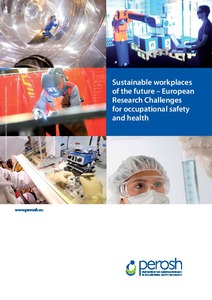Sustainable workplaces of future: European research challenges for occupational safety and health
"In line with the EU2020 Strategy for smart, inclusive and sustainable growth, one of the aims of the PEROSH research is to contribute to healthy, safe, innovative and sustainable workplaces, and in keeping people healthy and longer at work. Identification of the research needs and expected out...
| Institution: | ETUI-European Trade Union Institute |
|---|---|
| Format: | TEXT |
| Language: | English |
| Published: |
Brussels
2012
PEROSH |
| Subjects: | |
| Online Access: | https://www.labourline.org/KENTIKA-19133778124919519509-Sustainable-workplaces-of-futu.htm |
| Summary: | "In line with the EU2020 Strategy for smart, inclusive and sustainable growth, one of the aims of the PEROSH research is to contribute to healthy, safe, innovative and sustainable workplaces, and in keeping people healthy and longer at work. Identification of the research needs and expected outcomes is important to keep abreast of the emerging trends and risks in this field.
The consultation of the member institutes led to the prioritisation of seven main research challenges that are significantly prevalent and innovative in terms of preventing ill health and occupational accidents.
Particular challenges are the rapid ageing of the labour market population and that workers face longer working careers. At the same time, many workers leave the labour market prematurely due to disability and ill health. The working conditions of an ageing workforce and strategies to improve and retain fitness, as well as adequate return-to-work programmes should receive greater attention. Musculoskeletal disorders are the main occupational disease category affecting the European workers, and are amongst the most significant causes of sickness absence. Moreover, psychosocial risks are on the rise throughout Europe due to rapid changes in the nature of work and organisations and the growing competition on the global market.
The emergence and development of new technologies such as information and communication technology solutions, robotics and nanotechnologies, have lots of potential for new preventive solutions, changing working conditions and the workplace environment. At the same time, they can lead to new risks to workers and overrule known solutions. As nanotechnology applications and use expand very rapidly, safety of emerging nanomaterials should be integrated as quickly as possible. A European position in these fields is required to understand these complexities, and anticipate the opportunities and consequences of implementation in a coordinated manner.
There is also a need for effective prevention of accidents at work, particularly among vulnerable groups and in small and medium-sized enterprises. The integration of a ‘safety culture’ and a ‘zero accident vision’ in European enterprises and organisations can have positive impacts on OSH management. Research should thus contribute to a positive safety culture in enterprises.
The PEROSH members will continue to proactively cooperate along these lines to further enhance European evidence-based research collaboration on the current and future working environment. A proactive identification of new areas of focus for research and development, and the analysis of themes in which European strategic partnerships can be enhanced, are necessary to be able to overcome future challenges. " |
|---|---|
| Physical Description: | 36 p. Paper Digital |

